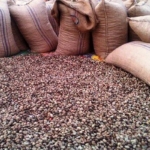
Ghana and the wider West African cashew belt have turned cashew into a fast-growing cash crop and a rural lifeline — but growth has come with environmental and market risks. Ghana produced about 107,700 tonnes of raw cashew nuts in 2022, according to the Food and Agriculture Statistics. Though 2024 season reports indicate production volatility and an estimated 30% drop in some seasons, underscoring fragility in supply and incomes.
While the country looks at increasing productivity, a greener production practice is essential for a more sustainable cashew industry.
Agroforestry and diversification
Switching from monoculture expansion to agroforestry — planting cashews with native trees, food crops and shade species — increases soil health, reduces erosion and preserves biodiversity while keeping farmers’ food security intact.
World Bank and academic analyses find agroforestry raises resilience and can boost yields for smallholders where productivity remains low – often under 1 tonne/ha in parts of Ghana.
Integrated pest management and residue control
Meeting export markets means managing pests without heavy chemical overuse. The European Union enforces strict maximum residue levels (MRLs) for pesticides on nuts; exporters whose produce tests above MRLs risk shipment rejection and reputational damage. Investing in integrated pest management (IPM), biological controls and farmer training reduces chemical dependence and helps preserve market access.
Post-harvest upgrades: dryers and sorting
The African Cashew Alliance highlights simple, solar-assisted drying, improved harvesting timing and grading lower post-harvest losses and fungal contamination — raising kernel quality and reducing the need for storage chemicals. These low-carbon investments pay off quickly by improving price realisation in higher-value markets.
Building stronger markets
Invest in local processing
West Africa supplies most raw cashew nuts (RCN), but Vietnam and India process the bulk of kernels — an imbalance that leaves much value exported as raw materials. Strengthening local processing capacity in Ghana and neighbouring countries keeps margins and jobs in the region and insulates producers from fluctuations in global raw-nut demand. The Centre for the Promotion of Imports from developing countries’ value-chain analysis shows substantial gains when processing shifts closer to the origin.
Transparent origin and traceability
Buyers increasingly demand proof that nuts were not grown on recently deforested land. Digital traceability — farmer registries, geo-tagging, and batch traceability — helps unlock premium EU customers and development finance. Collective farmer organisations and co-ops make traceability affordable for smallholders.
Gender and inclusion
Programs such as SheTrades adopted in Sierra Leone and the Ivory Coast demonstrate that targeted training and finance for women in the cashew chain (from farms to processing) increase productivity and household resilience — widening the pool of skilled workers for domestic processing expansion.
Navigating EU trade regulations
Deforestation-free due diligence (EUDR)
The EU Regulation on deforestation-free products requires operators placing certain commodities on the EU market to ensure supply chains are free from deforestation and to perform due diligence on origin, geolocation and legality. While cashew is not always singled out among early priority commodities, similar expectations are rising across nuts and derivatives; buyers in the EU will demand verifiable proof that cashew does not drive forest conversion. Compliance is rapidly becoming a market-entry requirement, not a nicety.
Food safety and pesticide controls
Beyond land-use due diligence, European buyers enforce food-safety standards. Ghanaian stakeholders must harmonise extension messaging, pesticide registration and residue monitoring to avoid costly border rejections. Investment in testing labs and regional cooperation on MRL-compliant pest management will protect access to the lucrative EU kernels market.
Policy and private sector priorities
1. Subsidise low-carbon investments: small grants or blended finance for solar dryers, quality sorting lines and traceability tech.
2. Scale agroforestry extension: train extension agents and use nursery networks to supply multi-purpose shade and native species.
3. Strengthen local processors: targeted tariffs, credit lines and incentives to build value-added capacity and create kernel-grade supply.
4. Regional coordination: harmonise MRL guidance, testing protocols and traceability standards across West Africa to avoid a patchwork of buyer demands.
Conclusion
Ghana and its West African neighbours can convert the cashew boom into a durable, greener success story — but only by marrying on-farm sustainability with higher-value processing and rigorous compliance with evolving EU rules. Investments in agroforestry, post-harvest technologies, traceability and local processing are no longer optional: they are the ticket to resilient rural incomes and reliable access to premium markets.




